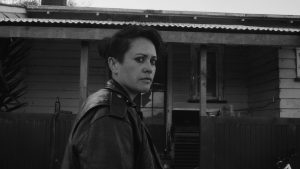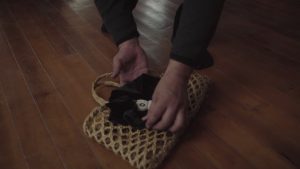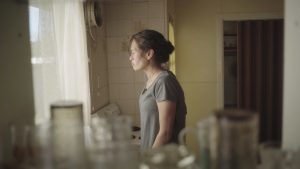By Gill Pringle
Eight women Maori directors have come together to make Waru, a feature film centered on the funeral of a young child. Each woman directs a separate chapter of the story, forming a kind of cinematic collage of the unseen death and the way it affects the entire community. Ultimately, the film looks at the societal and cultural forces behind child neglect and abuse.
FilmInk was lucky enough to sit down with some of the filmmakers at the Toronto International Film Festival: Awanui Simich-Pene, Briar Grace-Smith, Josephine Stewart-Tewhiu, Renae Maihi, Casey Kaa, Chelsea Cohen, and Paula Whetu Jones.
 What inspired this?
What inspired this?
CHELSEA: You applied if you wanted to be a part of this project. They put out an ad on social media and many of us applied although some of us were approached directly. Brown Sugar Apple Grunt, the producers, put out a call saying they were looking for eight women to direct eight vignettes to put together this film called Waru.
RENAE: I can’t speak for [producers] Kiel [McNaughton] or Kerry [Warkia] but he was saying he was going to put in an application to the New Zealand Film Commission to find funding so he could make a film centered around the death of a child and child abuse – but as he was about to put this application in, it felt fraudulent to him and he realised that the story needed to be told from a woman’s perspective so then they pulled us all together and we were offered a chance to be a part of it.
So, we came around this table with our own ideas, although in a sense, we came in blank and each woman was able to make an offer of where they wanted to come in with the story.
PAULA: I think it should be noted too that when they put the call out for Maori women directors, they didn’t expect to find enough Maori women to do it and they ended up with 50 applications.
Was the story ripped from the headlines?
PAULA: The New Zealand stats are pretty grim.
 Why do you think that women are so vilified in culture?
Why do you think that women are so vilified in culture?
PAULA: I think it’s because we are the nurturers.
What reaction do you hope to receive from this?
CHELSEA: At home we never see, or very rarely see women on screen, let alone Maori women – so people are finding this is quite fresh and quite shocking, just having that perspective – and for us, I don’t think any of us really thought, ‘Wow, I’m consciously writing something very fresh’. We’re only telling the stories that we know and that we’ve been trying to tell for ages.
CASEY: A term that they’ve been using with us a lot is ‘breaking the silence’. And that’s what they’ve been saying in New Zealand – and that’s the silence on women having voices and breaking the silence of indigenous women having voices and also breaking the silence on not having a conversation surrounding child abuse. And being able to have a forum in which people come and view and then feel like they’re more open to have a discussion or make change or see themselves in the characters and are able to stand up for more children – and that’s the point of why we did it.
PAULA: First and foremost for me, I wanted to start a discussion. I want people to talk about what they’re seeing; whether they understand it or not is beside the point because a lot of people don’t, but at least they‘re talking about it.
CHELSEA: I think one of the greatest illnesses in our society – and I know it’s effected my life as well, is a tendency to sweep everything under the carpet and not acknowledge truly what’s happening or talk about it and process emotion. So, when you have a film that is confronting and doesn’t shy away from looking at those issues, then people have to talk to it.
 What do you think are the underlying causes of child abuse in New Zealand?
What do you think are the underlying causes of child abuse in New Zealand?
BRIAR: Every five weeks there’s a child killed in New Zealand.
There’s lots of reasons – stress, poverty, the growing gap between rich and poor. Apparently, we have the highest rate of homelessness per capita in the world. People don’t understand that about our country, they think it’s green and mountainous and beautiful; also the highest suicide rate of under 25s.
Our statistics are probably not dissimilar to any native people around the world who have experienced the same colonization. First nations people here, native Americans, the Australian Aboriginal people – we’re all just reacting to what happened to us when our lands were taken from us. Our culture was taken from us; our spirituality was taken from us – and it was met with violence. If I raised a child in that environment, do you think it’s going to turn out to be a happy, healthy individual? Probably not.
AWANUI: I think the effect has been huge on our people and it’s because of loss of tribal lands, loss of our language and that cultural and spiritual deprivation has created the sting of poverty and addiction – and I grew up with that, so I know that. That can really destroy families. When someone is off their face, they are not taking care of their children. Poverty causes the stress to rise and you’re just trying to make ends meet and then you’re drinking on top of that and there’s the drugs and the alcohol and all that plays a really big part in our children being neglected and it’s this vicious cycle which is inter-generational and it has been for a long time. And we’re raised in these families where that happens and then we come into being parents and that continues on and it’s really difficult. It’s about bringing our families into recovery again so they can see the light and then start looking after ourselves again.
PAULA: It isn’t just a cultural thing for me – it’s a universal issue. Like white people kill their children too, Chinese people… everybody has child abuse in their culture. This isn’t exclusively a Maori issue, it just so happens that we’re Maori women telling the story of Waru. It’s very important to us that this is not just a Maori film for Maori – it’s a universal issue.
 What has the male response been like?
What has the male response been like?
AWANUI: A young Maori man, an up and coming actor, came up to Casey and I after a screening and he was blown away by the film and really moved by it. He said he wanted to be part of the movement – because that’s what it is, it’s a movement!
RENAE: We also had a beautiful man who lost his words at a Q&A, he said he used to be part of a government body which used to protect women and waru, and the day the government closed down that institution was the day we started losing more and more waru – and he couldn’t breathe or talk to us. He was inconsolable. He’s been trying to protect what he calls “all the waru” of the world.
JOSEPHINE: To give you context, our Governor got voted in nine years ago and it’s been the same since. It’s very conservative with a low number of women politicians in their party and a low number of Maori.
CASEY: A lot of men have started sharing their experiences about how they grew up.
Waru screens as part of the Winda Film Festival on November 24, before being released on December 11, 2017 through On.Demand.



